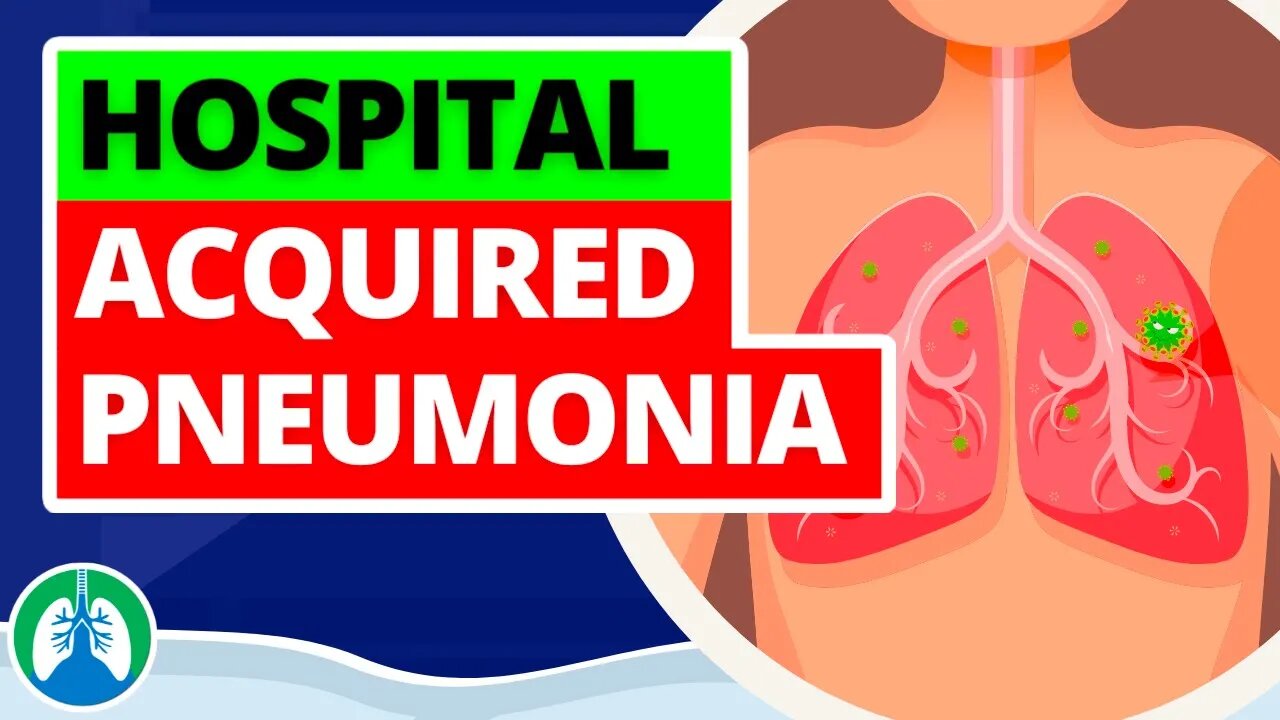Premium Only Content

Hospital-Acquired Pneumonia (Medical Definition) | Quick Explainer Video
What is Hospital-Acquired Pneumonia? This video covers the medical definition and provides a brief overview of this topic.
💥Pneumonia [Full Guide] ➜ ➜ ➜ https://bit.ly/2LXMg7b
💥Ventilator-Associated Pneumonia (VAP) [Full Guide] ➜ ➜ ➜ https://bit.ly/3cHhqvz
➡️ What is Pneumonia?
Pneumonia is an infection that causes inflammation in the lungs and results in fluid build-up, fever, cough, and difficulty breathing. It's caused by a variety of different organisms including viruses, bacteria, fungi, and even parasites in some cases. When this disease is contracted inside of the hospital, as previously mentioned, it is referred to as hospital-acquired pneumonia.
➡️ Types of Pneumonia
- Hospital-Acquired Pneumonia (HAP)
- Community-Acquired Pneumonia (CAP)
- Ventilator-Associated Pneumonia (VAP)
- Aspiration Pneumonia
➡️ Types Explained
The specific type of pneumonia is classified according to how the patient acquires the disease. CAP is when the patient gets it outside of the hospital. VAP is when it’s acquired while the patient is on the mechanical ventilator. Aspiration pneumonia is acquired when a patient aspirates bacteria into the lungs, usually from food, saliva, or stomach acid. For it to classify as this type, the patient must acquire the infection more than 48 hours after being admitted to the hospital. This is how we can differentiate it from community-acquired pneumonia. A pneumonia infection can vary from mild to severe, depending on the patient's signs and symptoms.
➡️ Signs and Symptoms
- Productive cough
- Fever and chills
- Tachypnea
- Shortness of breath
- Chest pain
- Diaphoresis
- Fatigue
- Cyanosis
➡️ Severity Level
Being able to recognize the signs and symptoms is important for the diagnosis, treatment, and patient outcome. Hospital-acquired pneumonia is often more severe because usually, the patient is already sick enough to require hospital admission. In some cases, these patients are more susceptible due to an already weakened immune system. Hospital-acquired pneumonia is often spread to the patient by healthcare workers when they pass germs from their hands, clothes, or instruments. This can be avoided with proper handwashing, PPE, and other safety measures.
➡️ Treatment Methods
- Antibiotic medications
- Oxygen therapy
- Bedrest
- Airway clearance therapy
- Hyperinflation therapy
- Fluid management
💥Pneumonia [Full Guide] ➜ ➜ ➜ https://bit.ly/2LXMg7b
—————
📗 BEST STUDY GUIDES FOR YOU
▪ TMC Test Bank 👉 http://bit.ly/2IGeqSu
▪ Hacking the TMC Exam 👉 http://bit.ly/2XBc8do
▪ TMC Exam Bundle (Save $) 👉 https://bit.ly/34pqEsV
▪ Daily TMC Practice Questions 👉 http://bit.ly/2NnXh3C
💙MORE FROM RTZ
▪ Free TMC Practice Exam 👉 http://bit.ly/2XlwASL
▪ Free RRT Cheat Sheet 👉 http://bit.ly/2IbmOKB
▪ Resources for RT's 👉 http://bit.ly/2WVV5qo
▪ Testimonials 👉 http://bit.ly/2x7b5Gl
🌐FOLLOW US
▪ Instagram 👉 http://bit.ly/2FhF0jV
▪ Twitter 👉 http://bit.ly/2ZsS6T1
▪ Facebook 👉 http://bit.ly/2MSEejt
▪ Pinterest 👉 http://bit.ly/2ZwVLPw
🚑MEDICAL DISCLAIMER
This content is for educational and informational purposes only. It is not intended to be a substitute for professional medical advice, diagnosis, or treatment. Please consult with a physician with any questions that you may have regarding a medical condition. Never disregard professional medical advice or delay in seeking it because of something you watch in this video. We strive for 100% accuracy, but errors may occur, and medications, protocols, and treatment methods may change over time.
💡AFFILIATE DISCLAIMER
This description contains affiliate links. If you decide to purchase a product through one of them, we receive a small commission at no cost to you.
—————
⏰TIMESTAMPS
0:00 - Intro
0:20 - What is Pneumonia?
0:44 - Types of Pneumonia
0:52 - Types Explained
1:39 - Signs and Symptoms
1:55 - Severity Level
2:33 - Treatment Methods
—————
🖼CREDIT FOR MUSIC AND GRAPHICS:
▪ Music licensed from Audiojungle.net/
▪ Graphics: Canva.com, Freevector.com, Vecteezy.com, and Pngtree.com
#RespiratoryTherapy #RespiratoryTherapist #Pneumonia
-
 3:17
3:17
Respiratory Therapy Zone
1 year agoWhat is Silicosis? (EXPLAINED) 🫁
444 -
 43:54
43:54
Ben Shapiro
1 hour agoEp. 2150 - Trump’s STATE OF THE UNION Pledge
5.9K4 -
 1:26:36
1:26:36
Russell Brand
2 hours agoZelensky’s Misstep: Why It Backfired & What Comes Next – SF547
59.5K30 -
 56:23
56:23
The Dan Bongino Show
4 hours agoThe Momentum Keeps Shifting (Ep. 2435) - 03/04/2025
579K824 -

Benny Johnson
3 hours ago🚨Trump Attorney General Drops a New ‘TRUCKLOAD’ of Epstein Evidence | Kash FIRES FBI Head, Cover-Up
74.2K85 -
 59:30
59:30
The Rubin Report
3 hours agoMarco Rubio Destroys CNN Host’s Narrative with Facts in Only 1 Minute
63.4K59 -
 2:04:21
2:04:21
Steven Crowder
5 hours agoWhat Are Pam Bondi's Real Motivations? What It Means For The Epstein Files
399K240 -
 2:03:49
2:03:49
LFA TV
17 hours agoTARIFFS HAVE BEGUN! | LIVE FROM AMERICA 3.4.25 11AM
68.3K19 -
 DVR
DVR
TheAlecLaceShow
3 hours agoGuest: George Papadopoulos | No Military Aid to Ukraine | Address to Congress | The Alec Lace Show
4.79K -
 33:54
33:54
Grant Stinchfield
2 hours ago $0.56 earnedBird Flu is Mutating & Now Measles! Big Pharma Wants you to Freak Out... Don't!
15.9K5